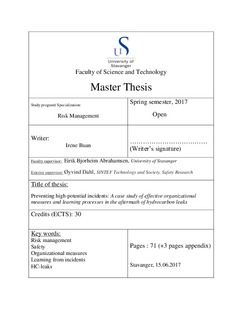| dc.description.abstract | According to the Petroleum Safety Authority Norway (PSA, 2017), the safety trend within the oil and gas industry is moving in the wrong direction with regard to high-potential incidents. In order to achieve a positive development again, there is a need for further improvement in terms of identifying and implementing effective preventive measures and learning from incidents. Due to this, it is of high importance to gather more knowledge about which types of measures are effective, and which are not. In 2011, the PSA conducted a study on causal factors and conditions linked to gas release incidents (PSA, 2011). The study revealed that the majority of the direct causes were linked to technical and human factors, while the underlying causes primarily were linked to organizational factors. The PSA (2013) concludes that to reduce the number of gas leak incidents, a higher focus on organizational measures and learning is needed.
The objective of this study is therefore to generate knowledge on effective organizational measures and learning processes of practical importance. In order to achieve this objective, the thesis is based on two intertwined research questions: 1) “What are the characteristics of effective organizational measures and learning from incident processes?” and 2) “What can the oil and gas industry and the concrete company studied in this thesis acquire from these characteristics in their work with prevention of high-potential incidents?”.
In order to answer the research questions, a literature review, semi-structured interviews and document analysis are performed. The purpose of the literature study is to identify the state of the art within the research area of effective organizational measures and learning from incident processes. The empirical basis of the document analysis is investigation reports and reports on proposed and implemented measures. The purpose of this empirical part of the thesis is twofold. First, to gather information about effective measures and learning from incident processes from front line personnel. Second, to gather information about the potential for improvement within the industry and within the studied company.
One of the key findings of the study was effective organizational measures are formulated as SMARTER actions with clear closing criteria, where the formulation is balanced properly between goal-oriented and prescriptive, and which ensures sustainability provided by a traceability in governing documents or other systems. Furthermore, it was found that the learning from incident process is only effective if all the phases of the process is properly executed. However, involvement of frontline personnel, safety delegates and others was identified as a significant contributor to achieving a successful learning from incident process. Moreover, it was recognized that the studied company (and the industry) needs to do some changes in their practices in the three last phases of the learning from incident process (planning intervention, intervening and the evaluating phase).
The implications of the study were identified as of importance not only for the studied company, but also for the industry in order to prevent high-potential incidents, such as gas leaks. The most significant practical implications were recognized as the importance of right involvement of personnel, proper formulation of measures and evaluation of measures and the learning from incident process. In addition, theoretical implications were identified as a need for more research on involving safety delegates in the learning from incident processes, how to avoid negative effects by using KPI systems, and lastly, how to ensure effective learning in shift-organizations. | nb_NO |

